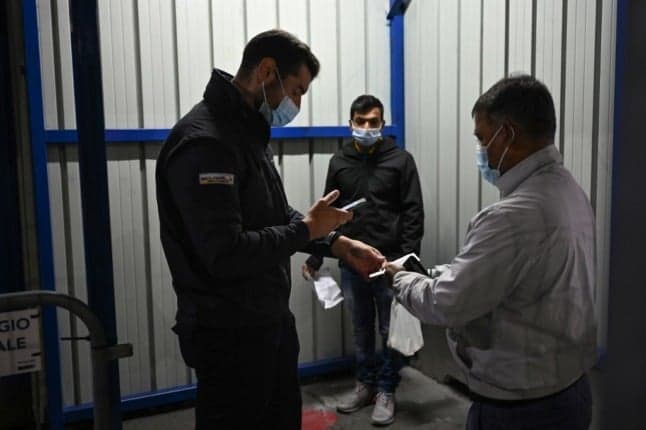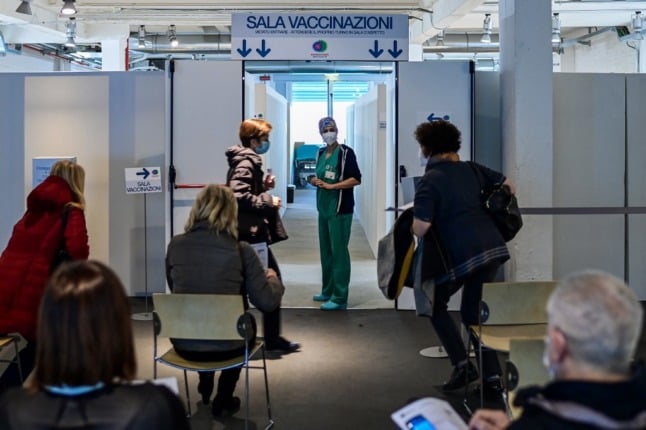Italy set to expand Covid 'super green pass' to all workplaces

The Italian government is expected to make vaccination mandatory for all employees. Here's what's on the table in the latest Covid decree.
All workers in Italy could be obliged to get vaccinated under Italy's latest anti-Covid measures - either through a vaccine mandate or by extending the so-called 'super green pass'.
The ‘super’ or ‘reinforced’ green pass health certificate, which proves vaccination or recovery, has already been made compulsory for access to almost all leisure, social or sporting activities in the country, but workplaces so far are not subject to the rule.
One hypothesis is that the government will make vaccines obligatory for all workers - or more likely - that it plans instead to make its Covid health pass a requirement for entry to all workplaces, therefore effectively making vaccination mandatory for all workers by default (if they aren't recovered).
Only healthcare staff, police, teachers and emergency services workers are currently subject to mandatory vaccinations.
The authorities are to meet on Wednesday to discuss the change to the nationwide Covid-19 health measures, making it the third decree in as many weeks after already bringing in two previous ones.
READ ALSO: Is Italy about to make Covid vaccine passes mandatory for all employees?
The move is intended to halt the rising infection numbers across Italy due to the omicron variant: some 1.125 million people in Italy are currently positive, according to the latest official figures, while just under 86 percent of the eligible population have completed a full vaccination cycle.

Photo by MIGUEL MEDINA / AFP
The authorities are still falling short of their goal to fully immunise 90 percent of the population, which they announced back in October, after reaching their previous 80 percent target just one week behind deadline.
The details of when the new rule comes into force and who it will apply to are still being discussed, but Italian media reports suggest that it could be a requirement from as early as next month. This would give time to those who are not vaccinated or haven't yet fully completed the cycle to get a shot or a second dose.
Should a worker fail to produce a 'super green pass', it would effectively mean they would be refused entry to work.
The workplace would join a long list of other venues and services already set to be subject to the requirement, effective from January 10th.
Calendar: When do Italy’s Covid-19 rules change?
At the moment, only the basic form of the health passport is needed at workplaces (unless you’re in one of the categories subject to the vaccine mandate).
The basic green pass can be obtained via a negative test result – though these passes are only valid for a couple of days, meaning people who refuse vaccination must get tested several times a week in order to go to work.
From February 1st green passes based on vaccination will expire after six months. If you get a third or booster dose, your pass will then be renewed for another six months.
For further information about Italy’s current Covid-19 health measures, please see the Italian Health Ministry’s website (available in English).
Comments
See Also
All workers in Italy could be obliged to get vaccinated under Italy's latest anti-Covid measures - either through a vaccine mandate or by extending the so-called 'super green pass'.
The ‘super’ or ‘reinforced’ green pass health certificate, which proves vaccination or recovery, has already been made compulsory for access to almost all leisure, social or sporting activities in the country, but workplaces so far are not subject to the rule.
One hypothesis is that the government will make vaccines obligatory for all workers - or more likely - that it plans instead to make its Covid health pass a requirement for entry to all workplaces, therefore effectively making vaccination mandatory for all workers by default (if they aren't recovered).
Only healthcare staff, police, teachers and emergency services workers are currently subject to mandatory vaccinations.
The authorities are to meet on Wednesday to discuss the change to the nationwide Covid-19 health measures, making it the third decree in as many weeks after already bringing in two previous ones.
READ ALSO: Is Italy about to make Covid vaccine passes mandatory for all employees?
The move is intended to halt the rising infection numbers across Italy due to the omicron variant: some 1.125 million people in Italy are currently positive, according to the latest official figures, while just under 86 percent of the eligible population have completed a full vaccination cycle.

The authorities are still falling short of their goal to fully immunise 90 percent of the population, which they announced back in October, after reaching their previous 80 percent target just one week behind deadline.
The details of when the new rule comes into force and who it will apply to are still being discussed, but Italian media reports suggest that it could be a requirement from as early as next month. This would give time to those who are not vaccinated or haven't yet fully completed the cycle to get a shot or a second dose.
Should a worker fail to produce a 'super green pass', it would effectively mean they would be refused entry to work.
The workplace would join a long list of other venues and services already set to be subject to the requirement, effective from January 10th.
Calendar: When do Italy’s Covid-19 rules change?
At the moment, only the basic form of the health passport is needed at workplaces (unless you’re in one of the categories subject to the vaccine mandate).
The basic green pass can be obtained via a negative test result – though these passes are only valid for a couple of days, meaning people who refuse vaccination must get tested several times a week in order to go to work.
From February 1st green passes based on vaccination will expire after six months. If you get a third or booster dose, your pass will then be renewed for another six months.
For further information about Italy’s current Covid-19 health measures, please see the Italian Health Ministry’s website (available in English).
Join the conversation in our comments section below. Share your own views and experience and if you have a question or suggestion for our journalists then email us at [email protected].
Please keep comments civil, constructive and on topic – and make sure to read our terms of use before getting involved.
Please log in here to leave a comment.